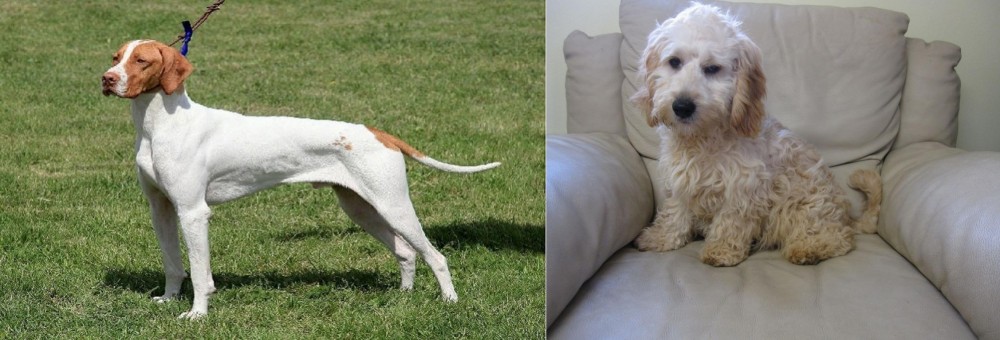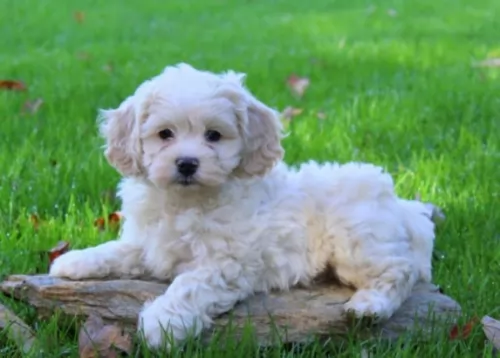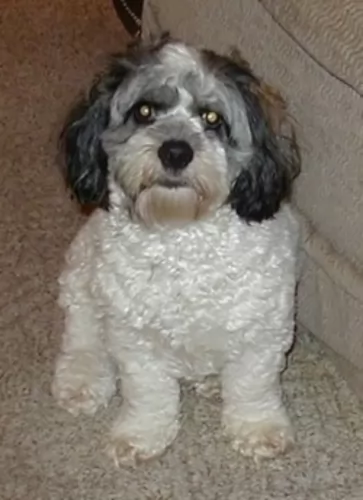 Petzlover
Petzlover Braque Saint-Germain is originated from France but Cockachon is originated from United States. Braque Saint-Germain may grow 23 cm / 10 inches higher than Cockachon. Braque Saint-Germain may weigh 26 kg / 58 pounds more than Cockachon. Both Braque Saint-Germain and Cockachon has same life span. Both Braque Saint-Germain and Cockachon has almost same litter size. Both Braque Saint-Germain and Cockachon requires Low Maintenance.
Braque Saint-Germain is originated from France but Cockachon is originated from United States. Braque Saint-Germain may grow 23 cm / 10 inches higher than Cockachon. Braque Saint-Germain may weigh 26 kg / 58 pounds more than Cockachon. Both Braque Saint-Germain and Cockachon has same life span. Both Braque Saint-Germain and Cockachon has almost same litter size. Both Braque Saint-Germain and Cockachon requires Low Maintenance.
 The Braque Saint-Germain, also known as the St. Germain Pointing Dog, is a French creation. The French pointing dogs and the English pointing dogs were mixed to develop the Braque Saint-Germain. He is a versatile hunting dog that was both a pointer and a gun dog. They are medium to large in size and went from being bred by royalty in the 1830’s to a popular everyday hunting dog. The ancestry of the breed can be traced back many additional centuries.
The Braque Saint-Germain, also known as the St. Germain Pointing Dog, is a French creation. The French pointing dogs and the English pointing dogs were mixed to develop the Braque Saint-Germain. He is a versatile hunting dog that was both a pointer and a gun dog. They are medium to large in size and went from being bred by royalty in the 1830’s to a popular everyday hunting dog. The ancestry of the breed can be traced back many additional centuries.
As popular as the Braque Saint-Germain was as a hunter, he gained his notoriety in the show ring. The first time a Braque Saint-Germain entered the ring in 1863 it was an acclaimed breed and upstaged all other pointing breeds. The French Braque Saint-Germain club was opened in 1913 and recognized by the Federation Cynoloqique International (FCI) and in 2006 was recognized by the North American United Kennel Club. Their popularity has risen and fallen since World War II. It has flirted with extinction more than once. Today’s Braque Saint-Germain is a highly talented hunting dog with a standard appearance that still does well in the ring.
The English Pointer was a cross between the hound dogs, British gundog, Spanish Pointer and herding breeds. This made the English Pointer a very versatile breed before it was crossed with the Braque Francais Gascogne. The Braque Francais Gascogne itself is believed to have developed from the Chien d-Oysel and Italian and Spanish pointing dogs. The English Pointer was specialized in pointing and the French Braque Francais Gascogne was a very versatile dog. In the Braque Saint-Germain the dog world has a versatile, excellent pointing dog.
In the 1800’s the French Crown was gifted with two English Pointers that were great at hunting. Some considered the English Pointers to be better than any of their Braque Francais. The female of these two pointers was bred many times but the male died without breeding. The female’s first litter was with a brown German Spaniel and were of low quality. Her second litter however was with an outstanding bird dog and produced 7 excellent puppies. Because of this these two dogs were bred several more times. The owner of the adult dogs moved to Saint-Germain, where their appearance attracted many hunters. The breed flourished here and was named the Braque Saint-Germain.
Soon corrupt individuals sold non-purebreds as Braque Saint-Germains and handlers showed these dogs under the Saint-Germain name. There are always dangers when a popular breed’s beginnings comes from only two dogs. In 1913 the new breed club fought over the standard and ended up producing two types. The first type was a sturdy dog with long ears and a round chest. He was larger and slower than his cousin. The second type was a smaller dog with a finer skeleton and short, high set ears. He was a galloper to his cousin’s trot.
The breed found itself facing near extinction in 1914 and during all of World War I. Dogs were not bred and many were not properly cared for. The breed became quite rare. Then as it began to recover, the Second World War intervened and devasted the breed again. By the end of the war, they were once again very rare and on the edge of extinction. It took a dedicated effort from local breeders to bring the breed back. By the 1950’s the two types of Braque Saint-Germain dogs were molded into only one breed. There remained a conflict between those that bred show dogs and those that bred hunting dogs.
Slowly the breed grew in number and in the late 1990’s there were over 100 puppies registered into the club every year. More than 100 were entered into the clubs in 2009. There have also been a few English Pointer crosses allowed to breed with the Braque Saint-Germains in order to grow and improve the gene pool. Still the breed is exceedingly rare outside of France. Through it all the breed has been able to maintain its place in confirmation and still be a versatile hunting dog.
 The Cockachon is not a pure bred dog but rather a cross between the Cocker Spaniel and the Bichon Frise. Very little if anything is known about who initially developed the Cockachon. It is known that the International Designer Canine Association (IDCA)registered and recognized the hybrid in 2009.
The Cockachon is not a pure bred dog but rather a cross between the Cocker Spaniel and the Bichon Frise. Very little if anything is known about who initially developed the Cockachon. It is known that the International Designer Canine Association (IDCA)registered and recognized the hybrid in 2009.
It is obviously a relatively new cross breed. The hybrid is also recognized by the American Canine Hybrid Club (ACHC), International Designer Canine Registry (IDCR) and the Designer Dog Kennel Club (DDKC).
 The Braque Saint-Germain is very much a pointer and yet is a very attractive dog. They have a medium build, drop ears and a long, level tail tapered at the end. They are really distinctive looking with an athletic, lean, muscled look. The skull is round and the muzzle is the same length as the skull. Their nose is pink , their lips cover their lower jaw and their eyes are golden, round and large. The ears are set high on the head and look like they are slightly detached. The neck is long, muscular and arched, while they have deep chest. They are well proportioned, good looking dogs with a friendly facial expression. Their coat is true to the pointing dog group as it is short, smooth and white with orange markings. Dogs of any other color might be great hunting dogs but are not show dogs and should not be bred
The Braque Saint-Germain is very much a pointer and yet is a very attractive dog. They have a medium build, drop ears and a long, level tail tapered at the end. They are really distinctive looking with an athletic, lean, muscled look. The skull is round and the muzzle is the same length as the skull. Their nose is pink , their lips cover their lower jaw and their eyes are golden, round and large. The ears are set high on the head and look like they are slightly detached. The neck is long, muscular and arched, while they have deep chest. They are well proportioned, good looking dogs with a friendly facial expression. Their coat is true to the pointing dog group as it is short, smooth and white with orange markings. Dogs of any other color might be great hunting dogs but are not show dogs and should not be bred
 The Cockachon is a cute, little dog very popular in current times. He is small, compact, dark eyes, a round head and black nose. He has a baby face and fluffy hair. It has a furry tail and a blunt muzzle.
The Cockachon is a cute, little dog very popular in current times. He is small, compact, dark eyes, a round head and black nose. He has a baby face and fluffy hair. It has a furry tail and a blunt muzzle.
The Cockachon is a mix between the American Cocker Spaniel and the Bichon Frise. In order to get a better idea of what the hybrid can look like just look at the individual parents. The American Cocker Spaniel is a small dog with a short muzzle and domed head. It is in the Sporting Group, but it is the smallest member of the group. He has a compact, sturdy body and though domed his head is refined.
The Cocker’s stance includes a sloping topline, muscular hindquarters and strong shorter legs adds up to a balanced canine. The coat can be in a wide variety of colors including liver, golden, black, and red. Also, it could be liver and tan, black and tan, roan or tricolors. So, while the Bichon Frise is always white the Cockachon can be any of these colors including white. The types of coats that the Cocker Spaniel and the Bichon Frise have are very different as well.
The Bichon Frise is also a small dog, actually smaller than the American Cocker. The Cockachon usually ends up being about the size of the Bichon at 5-10 kg in weight and 23-30 cm in height. The skull of the Bichon Frise is round rather than domed and the muzzle is also rounded. The tail is long and curly while the Cocker would usually have a cropped tail. The nose and eyes of the Bichon Frise are black and its hair is dense and curly. Unlike the Cocker Spaniel it barely sheds.
Many Cockachon have floppy ears, curly coats and come in any variety of colors though many, many are white.
 The Braque Saint-Germain is a working dog and a show dog. They are energetic, competitive and driven. They are generally affectionate, loyal and love to cuddle with their people. They need human companionship companionship and can have severe separation anxiety when left by themselves. They love being a member of the family with children, but they are likely to knock very young children down unintentionally.
The Braque Saint-Germain is a working dog and a show dog. They are energetic, competitive and driven. They are generally affectionate, loyal and love to cuddle with their people. They need human companionship companionship and can have severe separation anxiety when left by themselves. They love being a member of the family with children, but they are likely to knock very young children down unintentionally.
The Braque Saint-Germain is a loyal, gentle breed and some might even be shy. They are not guard dogs. They are much too friendly toward strangers. Even though they were bred to point and track small game, they can be socialized to be safe living with smaller pets such as cats. They are intelligent, fast learners who love to learn. They also love to work and work long hours without fatigue. They will love to be a jogging or cycling partner.
They do best with large yards, rural areas or in hunting packs. They are not small apartment, city dwellers. They do get along with strangers and other animals. They will warn of strangers, but they are not aggressive.
 People created the Cockachon to get a small, lap or carry dog that had certain characteristics. These characteristics included a very social, loving dog. He is active and friendly, sweet and gentle. He is loyal, and loves being loved. He is great with other dogs and you can trust him with your children. He is a little independent but very loyal.
People created the Cockachon to get a small, lap or carry dog that had certain characteristics. These characteristics included a very social, loving dog. He is active and friendly, sweet and gentle. He is loyal, and loves being loved. He is great with other dogs and you can trust him with your children. He is a little independent but very loyal.
Like many little dogs he can have serious separation anxiety. Crate training is recommended so that he has a place to feel safe when you are not with him.
 The breed has very few health issues even with all the cross breeding followed by inbreeding. Due to the small gene pool there might be some genetically inherited problems. Due to the size of the gene pool, they might suffer from “founder’s effect” where if one dog has a certain condition, their descendants could also. Not enough research has been done to know if this is the case with the Braque Saint-Germain of not.
The breed has very few health issues even with all the cross breeding followed by inbreeding. Due to the small gene pool there might be some genetically inherited problems. Due to the size of the gene pool, they might suffer from “founder’s effect” where if one dog has a certain condition, their descendants could also. Not enough research has been done to know if this is the case with the Braque Saint-Germain of not.
Some of the potential health issues that the3 Braque Saint-Germain might face include:
 Hybrid dogs seldom have a lot of inherited diseases as they seem to jump a generation but if they do, it can be either a combination of both breeds issues or issues from just one of the breeds in the cross. For the Cockachon these issues include:
Hybrid dogs seldom have a lot of inherited diseases as they seem to jump a generation but if they do, it can be either a combination of both breeds issues or issues from just one of the breeds in the cross. For the Cockachon these issues include:
This loose kneecap issue is common to many small dogs and can cause lameness if not addressed.
Eyelid problems such as the ones that might bother a Cockachon can be found in many small dogs. These include Entropion and Ectropion.
 This is a working dog that can run and track for miles. She needs good nutrition. Feed about 3 cups per day in one or two meals. Two meals are preferred.
This is a working dog that can run and track for miles. She needs good nutrition. Feed about 3 cups per day in one or two meals. Two meals are preferred.
As previously mentioned this breed might be susceptible to many genetic diseases or disorders but there have not been any studies to show this.
The Braque Saint Germain does not need a high amount of exercise as their energy level is medium. They still need daily exercise. They do best with a fenced off leash area to run. They love frisbee and chasing balls.
 Don’t overfeed a Cockachon. Give him ¾ -1.5 cups of dry food of high quality in two meals per day.
Don’t overfeed a Cockachon. Give him ¾ -1.5 cups of dry food of high quality in two meals per day.
In addition to the issues listed above, the Cockachon is also prone to heart disease and cardiac issues.
The Cockachon has a lot of energy for its size. Make sure it gets plenty of exercise. If walks are the exercise of your choice make sure you walk him for 30 minutes a day. He loves to play, and a back yard would be nice. These little guys do well in obedience but are usually to small for agility.